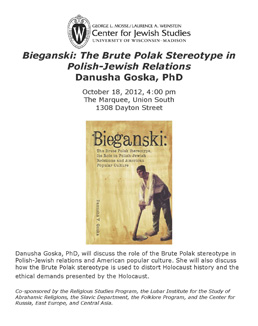
“‘My God is YHWH’: The Stories of Elijah in the Book of Kings”
 Steven L. McKenzie
Steven L. McKenzie
Wednesday, May 1, 2013
7:30 p.m.
325-326 Pyle Center
702 Langdon Street
Steven L. McKenzie is Professor of Hebrew Bible/Old Testament and Spence L. Wilson Senior Research Fellow at Rhodes College. He holds a B.A. (summa cum laude) and an M.Div. from Abilene Christian University and the Th.D. from Harvard University. He is a past president of the Board of Governors of the Institute of Egyptian Art and Archaeology at the University of Memphis. He is also a co-leader of the Middle East Travel Seminar, which tours Syria, Jordan, the Sinai, Israel, and Greece each Spring. He has written numerous books about the Old Testament, including The Trouble with Kings (1991), All God's Children: A Biblical Critique of Racism (1997), Introduction to the Historical Books (2010), and, with John Kaltner, The Back Door Introduction to the Bible.
The Book of Kings makes important, implicit claims concerning the nature, prerogatives, and relative powers of political leaders (kings) and religious leaders (prophets) in ancient Israel. This lecture will expose the ideological biases of these claims in the Book of Kings so as to clarify both the historical origins and the author's reshaping of the stories about the rophets Elijah and Elisha that constitute a relatively self-contained narrative unit within Kings. Approaching these stories in this way permits the audience to perceive the original settings of these narratives, how they were reshaped in writing the Book of Kings, and how that rewritten version became authoritative.
Presented by the Department of Hebrew and Semitic Studies and the University Lectures Committee; additional sponsorship by the Lubar Institute for the Study of the Abrahamic Religions, the Mosse/Weinstein Center for Jewish Studies, and the Religious Studies Program.
![]()
“Bieganski: The Brute Polak Stereotype and its Role in Polish-Jewish Relations and American Popular Culture”
 Danusha V. Goska
Danusha V. Goska
Thursday, October 18, 4:00 p.m.
The Marquee, Union South (1308 W. Dayton Street)
Danusha Goska took her Ph.D. at Indiana University. She has taught at Rutgers and at William Paterson University, and has written both scholarly and literary works. The latter include Love Me More: An Addict's Diary (2003), and the recently published Save Send Delete, a fictionalized conversation about God between a Roman Catholic professor and an atheist celebrity. Her scholarly work has focused on Polish Jewry; her monograph Bieganski: The Brute Polak Stereotype, Its Role in Polish-Jewish Relations and American Popular Culture, won the 2010 Oskar Halecki Award of the Polish American Historical Association.
Co-sponsored by the Religious Studies Program, the Lubar Institute for the Study of the Abrahamic Religions, the Department of Slavic Studies, the Folklore Program, and the Center for Russia, East Europe, and Central Asia
![]()
“Assessing the Impact of International Recognition on Conflict Attitudes”
 Yael Zeira
Yael Zeira
Minerva Postdoctoral Fellow
Stanford University
Thursday, March 14, 12:00 noon
422 North Hall
1050 Bascom Mall, CAMPUS
Yael Zeira is Minerva Postdoctoral Fellow at the Freeman Spogli Institute for International Studies and the Center on Democracy, Development and the Rule of Law at Stanford University. She received her Ph.D. from the Department of Politics at New York University in 2012, and in Fall, 2013, she will be Croft Assistant Professor of Political Science at the University of Mississippi. Her research agenda explores the sources and dynamics of political conflict and violence in the context of the Middle East, with a focus on the political behavior, attitudes and identities of ordinary individuals during times of conflict.
Dr. Zeira's talk will examine the effect of the recent United Nations General Assembly decision to recognize Palestine as a non-member observer state on Palestinian public opinion, including support for territorial compromise, support for the use of violence, inter-religious relations, and the role of religion in mediating the changes that took place. The report presents data from research undertaken by Dr. Zeira and Professor Nadav Shelef of UW-Madison on the impact of U.N. resolutions about Palestine's status on Palestinian attitudes towards religion, inter-group relations, and conflict resolution, a study funded in part by a grant from the Lubar Institute.
Sponsored by the Lubar Institute for the Study of the Abrahamic Religions, and held under the combined auspices of the Political Science Department’s International Relations and Comparative Politics Colloquia.

